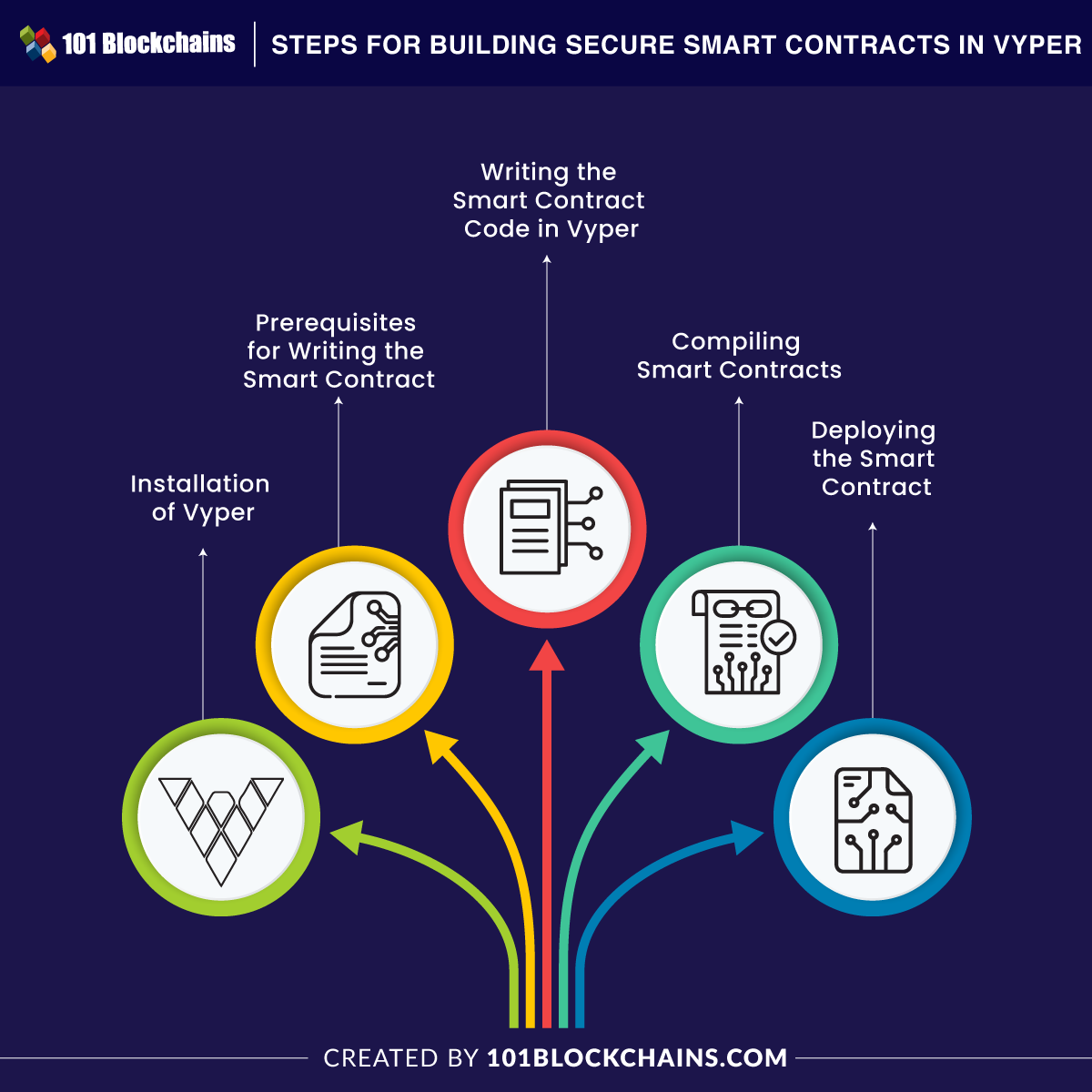Learn how blockchain truly works, master key definitions, and uncover what makes smart contracts so "smart." Dive into the fundamentals, gain valuable insights, and start your blockchain journey today!

- Solidity & Smart Contracts
James Howell
- on September 14, 2022
Build secure smart contracts using Vyper
The popularity of Vyper as a programming language for smart contracts has been gaining momentum in recent times. Solidity is the obvious topper when it comes to programming languages for developing and deploying smart contracts. How are Vyper smart contracts different from those developed on Solidity? The primary focus of Vyper in smart contract development rests on the importance of safeguards against vulnerabilities due to features.
Solidity opens up users to many features and tools, which imply increased exposure to security threats. Do you want to learn how to develop smart contracts by using Vyper? The following discussion serves you a tutorial for writing, compiling and deploying a smart contract in Vyper programming language.
Curious to understand the complete smart contract development lifecycle? Enroll in Smart Contracts Development Course Now!
The Vyper and Solidity Debate
One of the integral highlights in any Vyper smart contract tutorial would obviously focus on comparisons between Vyper and Solidity. Vyper is a smart contract programming language inspired heavily by Python and helps in creating EVM-compatible smart contracts. It is a strongly-typed programming language that allows you to use only one particular type of data.
Now, anyone would think of Solidity before they build secure smart contracts using Vyper because Solidity is the leader in smart contract programming languages. The answer points to the features of Vyper, which have been reduced to some of the urgent and most productive ones. Interestingly, the limited feature set on Vyper has been tailored for resolving many issues encountered by smart contract developers in Solidity.
Want to get an in-depth understanding of Solidity concepts? Enroll now in Solidity Fundamentals Course Now!
What are the Problems Solved by Vyper?

The guide on implementing smart contracts using Vyper would also include a detailed outline of the problems resolved by Python. Research-based evidence has confirmed that smart contracts can feature unwanted vulnerabilities, which generally lead to unpredictable behavior. One of the common issues would point to how smart contracts distribute off Ether supply to arbitrary addresses which never owned the contract, provided any data or deposited any Ether. Such smart contracts are referred to as prodigal contracts. Another type of risk with smart contracts refers to the suicidal contracts, which are killed off immediately in event of an emergency or inappropriate draining of Ether.
In addition, Vyper smart contracts can also have the best chances to avoid becoming greedy contracts, which can lock up Ether without any instructions for transferring them. On the other hand, you can also experience problems with posthumous contracts with Solidity. Such contracts stay on the Ethereum blockchain even after termination and can receive transactions, even if the transactions can provide interaction with contract code. As a result, posthumous contracts can end up locking the Ether received in the contract balance.
Now, you must note that writing smart contract in Vyper could help in avoiding such problems. The programming language features different limits alongside overflow checks for arithmetic ops and arrays. As a result, users can calculate a precise upper limit for gas consumption in smart contracts. At the same time, Vyper also offers support for decimal fixed-point numbers and signed integers effortlessly.
Smart contract developers must also know the basic principles underlying Vyper, which define its capabilities for writing, compiling, deploying and interacting with smart contracts. One of the prominent conclusions about Vyper as a smart contract programming language reflects how it serves solutions to the problems in prodigal, posthumous, greedy and suicidal smart contracts.
Build your identity as a certified blockchain expert with 101 Blockchains’ Blockchain Certifications designed to provide enhanced career prospects.
Steps for Building Secure Smart Contracts in Vyper
The steps for building Vyper smart contracts definitely deserve the attention for offering multiple features for security and functionality. If you want to develop secure smart contracts by using Vyper, then you have to follow the recommended course of steps. Let us take a look at the individual steps involved in creating secure smart contracts by using Vyper.

Installation of Vyper
The obvious first step in development of secure smart contracts with Vyper would focus on installing Vyper and the necessary libraries. Interestingly, you don’t have to search far and wide for installation of Vyper. However, you can install Vyper with Python 3.6 or a higher version. The official Python website can serve you as the ideal destination for downloading Python libraries alongside download guides. In addition, you would also need the “pip” package manager, which you can install by using the following component.
sudo apt-get install python3-pip
You can also try using a script for beginning the process to build secure smart contracts using Vyper and use the command,
python3 get-pip.py
In this case, you should ensure that you have a “pip package manager” global installation on the concerned device. You can use the “pip” command only to check the package manager. If the result comes as “command not found,” then you should manually set the path for pointing towards the ‘pip’ installation folder. In the case of Mac users, you can achieve the same functionality by using the following line with the “~/.bashrc” file.
export PATH="$PATH:/Users/chidumennamdi/Library/Python/3.8/bin"
The “pip” command in the terminal helps you find out whether it is in working condition. Subsequently, you can move to the next step of installing Vyper by using the “pip” command in the following syntax.
pip install vyper
If you are new to smart contracts, you might not be sure of its capability. Check the detailed guide Now on Smart Contract Use Cases
Prerequisites for Writing the Smart Contract
Once you have set up the Vyper programming language in place, you can move towards the next step in building secure smart contracts. The smart contract is basically a piece of code, and you can specify everything it has to do. Let us assume a simple example of writing smart contract in Vyper for storing and displaying a user name.
The recommended tool for testing the smart contract would be the Ropsten Testnet. The Ropsten Testnet helps in testing the smart contract with virtual or fake ETH before deployment on Ethereum mainnet. Before you create the smart contract code, it is important to get the essentials for writing the code.
First of all, you must depend on installation of the Metamask wallet as a mandatory prerequisite for smart contract programming. The Metamask browser extension could serve a vital role in facilitating interactions with Ethereum blockchain. You can download the browser extension and click on the logo of the extension in your browser. It would open up a new tab for the registration process. Enter your details for registration and login into Metamask extension, from where you must click on the dropdown menu. You have to choose the Ropsten Test Network option in the dropdown menu.
The Vyper smart contract tutorial would also emphasize on configuration of the Ropsten Test Network before you begin writing code. You can discover a copy icon next to the address of the Ethereum wallet in the form of a collection of alphanumerical numbers. Upon copying the address, you can use it to obtain access to free ETH. Now, you must paste the copied address in the text box in Ropsten Ethereum Faucet and click on “Send me test Ether” button to obtain free ETH. Upon accessing the Metamask browser extension, you can find the free ETH balance added to the account
Want to learn the basic and advanced concepts of Ethereum? Enroll in our Ethereum Development Fundamentals Course right away!
Writing the Smart Contract Code in Vyper
The process for writing and deploying smart contract code in Vyper can become easier to understand with awareness of structure of Vyper programs. It is important to note that most of the Vyper programs are scripted in files featuring the “.vy” extension. What are the essential components in a Vyper smart contract structure? Here is an outline of the important highlights in the structure of smart contracts.
Version Pragma: It provides information about the smart contract version and is essential for ensuring that the contract code goes through compilation process with the correct version of compiler.
State Variables: The unique variables help in storing information about a smart contract’s state and are generally associated with an external declaration with respect to smart contract functions. In addition, they also feature some initial values alongside the flexibility for access through the ‘self’ object.
Events: Specific processes or actions triggered according to specific conditions in the smart contract. The events are also logged in the logging channel of the EVM.
Structs: Structs are the critical components in smart contracts for defining the type of state variables.
Functions: The functions in smart contracts are basically the units of codes that can be executed for carrying out different types of actions with the smart contracts. Functions are an important part of writing smart contract in Vyper and feature internal or external validity. The functions can also work for returning values and accepting arguments.
Interface: Interface is a crucial element in structure of a smart contract as it provides specifications of the functions leveraged by the concerned smart contracts.
Let us assume a simple, smart contract code example to understand how to build secure smart contracts using Vyper with desired effectiveness. The simple code would work for saving a user name and also help the user in retrieving the user name. For this case, you would need the “vyper_contract” folder with a “contract.vy” file inside the folder. Now, you must add the following code to the “contract.vy” file.
# @version ^0.3.1 userName: public(String[100]) @external def __init__(name: String[100]): self.userName = name @view @external def getUserName() -> String[100]: return self.userName
The details of the different lines of code serve as an important highlight in implementing smart contracts using Vyper programming language. In the example code, you can notice each line serves a distinct functionality in the overall smart contract. For example, the first line serves as the pragma, which informs Vyper about the suitable compiler version for the smart contract.
In the second line of the code, the “userName” is actually a state variable and evidently stores the name of user. You can also notice the use of “@external” in the smart contract code, which specifies a specific function as an external function. It basically ensures that the concerned function can be subject to external calls.
The next highlight in the smart contract code refers to the “_init_” function, which is the constructor associated with the smart contract. Keep in mind that this function comes into play upon deploying smart contract with Vyper programming language. You must also notice the “@view” component in the smart contract code within the “getUserName” function.
It is important to note that the “@view” element informs Vyper that the function would not affect the blockchain state. The “@view” only works for reading state from the concerned blockchain network. Another important highlight of writing smart contract code is the ability of “getUserName” function to return the “userName” state variable.
Compiling Smart Contracts
The smart contract code could not perform on its own. You must follow the best practices for compiling smart contract on Vyper in a few simple steps. The “vyper” command is the easiest tool for starting the compilation process. Here is the command for compiling your Vyper smart contract.
vyper contract.vy
The terminal would serve an output in the form of a hexadecimal string, which represents the smart contract bytecode.
Now, you have to run the Vyper server by using the “vyper-server” command in the terminal. The Vyper server would start up on the URL http://localhost:8000/, which you can use in Remix for remote compiling and deployment.
Access the Remix IDE for remotely compiling and implementing smart contracts using Vyper programming language. Create the new file named “contract.vy” in the Remix IDE and paste the smart contract code into the file. In the next step, you have to install Vyper plugin in the Remix IDE. You can achieve the same by clicking on the “Plugin Manager” icon on the sidebar, followed by searching for ‘vyper.’ Click on “Activate” near the item which appears in the search results, followed by clicking on the Vyper icon.
In the final step of compiling smart contract on Vyper through Remix IDE, you have to click on the “Compile contract.vy” option.
Excited to learn about the critical vulnerabilities and security risks in smart contract development, Enroll now in the Smart Contracts Security Course!
Deploying the Smart Contract
The interactive functionalities of Vyper enable easier scripting and compilation of smart contract code. You can also explore similar ease in the process for deploying smart contract code with Vyper. Start the process by clicking on the Ethereum icon on the Remix IDE sidebar. Select the “ENVIRONMENT” dropdown menu and choose the “Injected Web3” option for accessing the Ropsten Testnet.
Just click on the “Deploy” option and make sure to provide the name near the ‘Deploy’ option. You can find the Metamask UI upon clicking the “Deploy” option, where you have to click on “Confirm” for deploying the smart contract to Ropsten Testnet. Once you have deployed the contract, you can interact with it through the Remix browser IDE by calling the specified methods. Users also have the option of viewing the contract through the Ropsten Ethereum Faucet only.
Want to know the real-world examples of smart contracts and understand how you can use it for your business? Check the presentation Now on Examples Of Smart Contracts
Bottom Line
The process to build secure smart contracts using Vyper programming language serves many plausible advantages for developers. You can notice the simplicity of the workflow for creating a secure smart contract with clearly organized installation of Vyper, scripting of smart contract code and testing and deploying the code.
Furthermore, the guidance regarding the structure of smart contracts on Vyper serves vital support in scripting smart contract code. Most important of all, the Remix IDE simplifies major complexities in the compilation, testing and deployment of smart contracts. Learn more about Vyper and its official documentation to use it for developing secure smart contracts right now.






